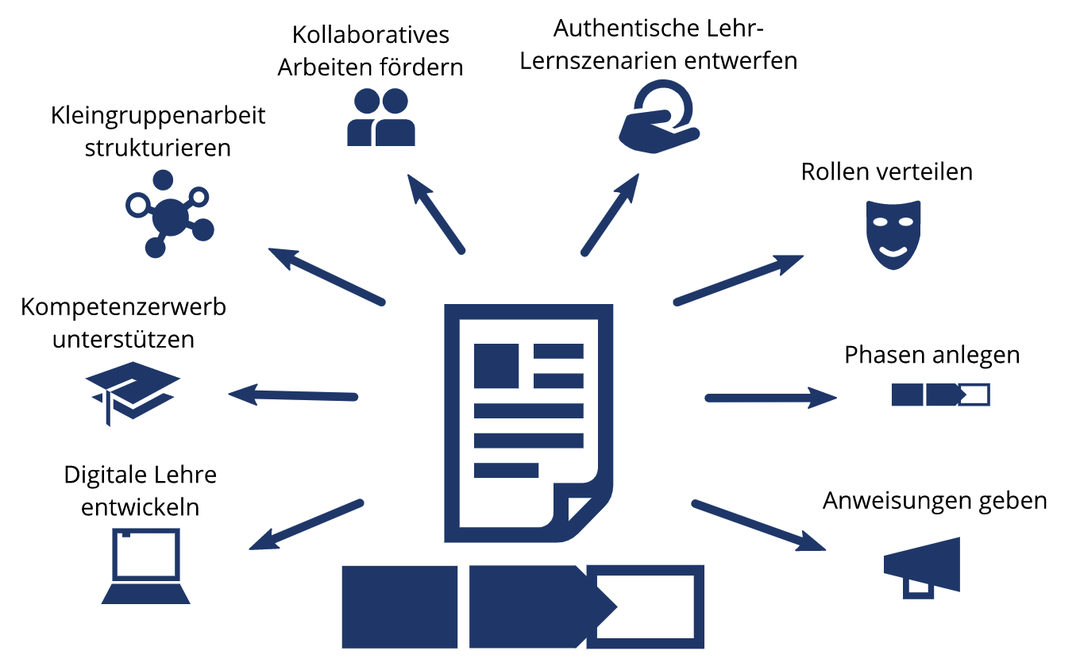Online Collaborative Scripts for the Analysis of Authentic Cases (Project 2)
Project description
Empirical findings on computer-supported cooperative learning show that unstructured collaboration among students is often less effective than individual learning.?Significantly more positive effects can be achieved through computer-supported cooperation scripts that distribute compatible cooperation roles in small groups and encourage students through prompts to show genuinely interactive processes in their roles. A generic plug-in is therefore being developed and provided with subject-specific content, with the help of which lecturers have the possibility of forming groups online, assigning the individual students different but compatible roles that are effective with regard to the competences to be acquired, and prompting appropriate learning activities in each case.?The resulting collaborative scripts are to be used to structure written or video conference-based online discussions of authentic, discipline-specific case studies presented in a classroom context or online (e.g. discussion of business decisions in economics, collaborative processing of mathematical proof problems, collaborative text analysis in history).?In this way, a large number of subject-specific teaching-learning scenarios for the implementation of digitally supported co-operative learning are created.?The Faculty of Philology and History, the Faculty of Mathematics and Natural Sciences and the Faculty of Economics are involved. In the third year of the project, the project will be transferred to the Faculty of 伟德国际_伟德国际1946$娱乐app游戏 Theology and the 伟德国际_伟德国际1946$娱乐app游戏.?
CO LEARN! - A DIGICAMPUS (STUD.IP) PLUGIN FOR STRUCTURING SMALL GROUP COLLABORATION PHASES IN TEACHING
Learning in small groups provides excellent opportunities to promote student learning. However, empirical findings on computer-supported cooperative learning show that unstructured collaboration among students is often less effective than individual learning. With?coLearn!, a new Digicampus (Stud.IP) plugin, small group collaboration phases in lectures, seminars, or exercises can be structured, planned, and implemented. With the help of?coLearn!, educators can particularly (a) create tasks to be worked on by student small groups, (b) divide the cooperation process into as many phases as needed, (c) distribute different roles among the learners within a small group, and (d) support students in the execution of their roles in various phases through additional guidance. Additionally,?coLearn!?offers educators diverse possibilities to monitor the group collaboration process and provide additional assistance to students as needed.
?
Click? here?for further information.?
?
?

Publications
2024
-
Greisel, M., Spang, L., Fett, K. & Kollar, I. (2024). Problem perception and problem regulation during online collaborative learning: What is important for successful collaboration? Frontiers in Psychology, 15,?1351723. https://doi.org/10.3389/fpsyg.2024.1351723
-
Opio-G?res, M., Kollar, I., & Dorner, B. (2024). Teaching students to perform child welfare assessments with adaptable computer-supported scripts and metacognitive reflection prompts. Journal of Social Work Education, 60(3), 360–375. https://doi.org/10.1080/10437797.2024.2338237
-
?zbek, T., Greisel, M., Wekerle, C., Gegenfurtner, A., & Kollar, I. (2024). How do different goals affect students' internal collaboration script configurations? Results of an epistemic network analysis study. Frontiers in Psychology, 15, 1410152. https://doi.org/10.3389/fpsyg.2024.1410152
-
?zbek, T., Greisel, M., Wekerle, C., & Kollar, I. (2024). Do Different Goals Affect the Configuration of 伟德国际_伟德国际1946$娱乐app游戏 Students' Internal Collaboration Scripts? Results of an Epistemic Network Analysis Study. In Clarke-Midura, J., Kollar, I., Gu, X., & D'Angelo, C. (Eds.), Proceedings of the 17th International Conference on Computer-Supported Collaborative Learning - CSCL 2024 (pp. 99-106). International Society of the Learning Sciences. https://doi.org/10.22318/cscl2024.633786
-
Steinherr, V. M., Brehmer, M., St?ckl, R., Reinelt, R. (2024). Design Science Research as a Guide for Innovative Higher Education Teaching: Towards an Application-Oriented Extension of the Proficiency Model. In Mandviwalla, M., S?llner, M., Tuunanen, T. (Hrsg.), Proceedings of the 19th International Conference on Design Science Research in Information Systems and Technology - DESRIST 2024. Trollh?ttan, Sweden: Design Science Research for a Resilient Future. Springer. https://doi.org/10.1007/978-3-031-61175-9_15
-
Kollar, I., Greisel, M., ?zbek, T., Spang, L. & Vogel, F. (2024). Computer-supported collaborative learning. In A. Gegenfurtner & I. Kollar (Hrsg.), Designing effective digital learning environments. New York, NY: Routledge.
-
Kollar, I. & ?zbek, T. (2024). Computergestütztes Lernen in interprofessionellen Kontexten. In U. Walkenhorst & M. Fischer (Hrsg.), Interprofessionelle Bildung für die Gesundheitsversorgung. Berlin: Springer.
2023
-
Greisel, M., Melzner, N., Dresel, M. & Kollar, I. (2023). How are achievement goals associated with self-, co-, and socially shared regulation in collaborative learning? Educational Psychology, 43(4), 384-402. https://doi.org/10.1080/01443410.2023.2211751
-
Spang, L., Greisel, M. & Kollar. I. (2023). Perceptions predict problem regulation? The role of homogeneous problem perception for successful regulation in collaborative learning. In P. Blikstein, J. van Aalst, R. Kizito, & K. Brennan (Hrsg.), Proceedings of the 17th International Conference of the Learning Sciences – ICLS 2023 (S. 1282-1285). Montreal: International Society of the Learning Sciences. https://doi.org/10.22318/icls2023.265880
2022
-
Melzner, N., Dresel, M. & Kollar, I. (2022). Examining the regulation of motivational and comprehension-related problems during collaborative learning. Metacognition and Learning, 17, 813-836. https://doi.org/10.1007/s11409-022-09316-9
-
Vogel, F., Kollar, I., Fischer, F., Reiss, K. & Ufer, S. (2022). Adaptable scaffolding of mathematical argumentation skills: The role of self-regulation when scaffolded with CSCL scripts and heuristic worked examples. International Journal of Computer-Supported Collaborative Learning, 17(1), 39-64. https://doi.org/10.1007/s11412-022-09363-z
-
Kollar, I. &? Greisel, M. (2022). Small group learning. In J. Zumbach, D. A. Bernstein, S. Narciss & G. Marsico (Hrsg.), International Handbook of Psychology Learning and Teaching (S. 1285-1303). Cham: Springer.
Project coordinator
- Phone: +49 821 598-2607
- Email: ingo.kollar@phil.uni-augsburgphil.uni-augsburg.de ()
- Room 2090 (Building D)
Project participants
- Moritz Klippert
- Carsten Neumann???????
- Melissa ?zsoy
- Dr. Amadeus Pickal????????????
- Ramona Reinelt????????????
- Christina Sammüller??
- Raphaela St?ckl????
- Dr. Martin Brehmer? ? ? ? ?
- Prof. Dr. Andrea Gottdang??????????
- Prof. Dr.?Marco Hien??????
- Prof. Dr. Ingo Kollar????????
- Prof. Dr. Marco Meier????
- Prof. Dr. Michael Sailer
- Alina Erl?????????????
- Tugce ?zbek???
- Birgit Weckerle
- Felix St?rk
- Nicole Cermak
- Prof. Dr. Kerstin Schl?gl-Flierl
- Laura Spang
- Dr. Vanessa Steinher? ?
Participating chairs and institutions (伟德国际_伟德国际1946$娱乐app游戏 of Augsburg)

The project "Strengthening Competence Development through Digital Authentic and Feedback-Based Teaching-Learning Scenarios" is funded within the framework of the funding announcement "Strengthening 伟德国际_伟德国际1946$娱乐app游戏 Teaching through Digitization" (FBM2020) with funds from the Innovation in 伟德国际_伟德国际1946$娱乐app游戏 Teaching Foundation.
?
?

